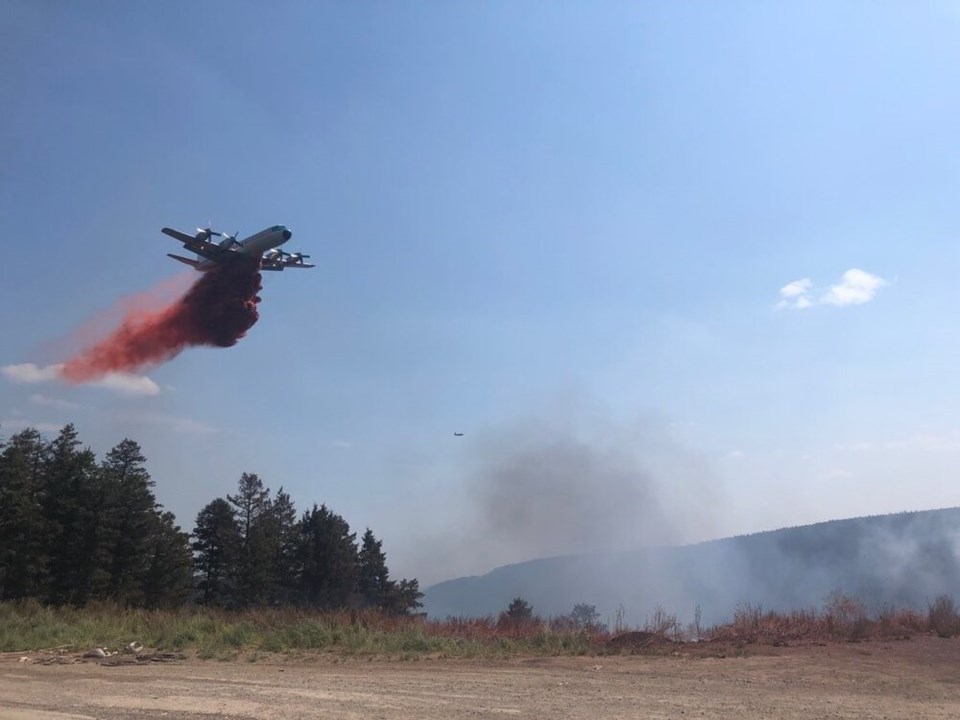A region of B.C. the size of Denmark where thousands of British Columbians have been evacuated by wildfire is calling on the government to declare a provincial state of emergency.
On Thursday, Thompson-Nicola Regional District’s board of directors voted unanimously to ask the provincial government to make such a declaration.
“All these fires are out of control,” says TNRD board chair Ken Gillis.
“The BC Wildfire [Service] people are out of firefighters. They’re allowing fires just to burn. I’ve never seen that in my life.”
There are over 300 wildfires currently burning across the province. Twenty-nine of those are considered “wildfires of note,” out of control and either highly visible or posing a potential threat to public safety.
Declaring a provincial state of emergency would allow the province to “implement all procedures that the minister considers necessary to prevent, respond to or alleviate the effects of an emergency or a disaster.”
“It is a desperate situation. I don’t know what more we can do,” Gillis tells Glacier Media. “We’re all frightened. We’ve pulled out all the stops.”
But on Thursday, Brendan Ralfs of Emergency Management BC said a state of emergency has not been necessary to assist people and access funding. B.C. Premier John Horgan has previously said the province would declare a state of emergency when the BC Wildfire Service suggested it do so.
Across the TNRD, there are roughly 3,746 properties are on evacuation alert. Another 815 homes have been evacuated, according to Michelle Nordstrom, information officer at the TNRD’s emergency operations centre.
Of the TNRD 11 electoral districts, six are under a state of emergency.
“Resources are getting spread really thin. We’re being challenged with getting security with all of our checkpoints,” says Nordstrom. “From our perspective, we’re having a difficult time keeping up.”
Whereas in past fire seasons the emergency operations were coordinated from a single hotel, this year, concerns over COVID-19 have led planners to push people into private hotels instead of group shelters.
Those hotels, says Nordstrom, are already full, something that’s concerning considering the geographical spread and intensity of the fires. And with so much moke in the air, firefighters are having trouble finding spot fires before they grow, says Gillis.
A forecast of dry lightning is only expected to make things worse over the weekend.
“It’s big. It’s anxiety-inducing. It’s so early,” says Nordstrom.
At a Thursday press conference, Rob Schwietzer, director of fire centre operations with the BC Wildfire Service, said there are about 2,500 personnel involved in the province's fire fight, along with 118 personnel from Quebec, New Brunswick, Newfoundland, Alberta, Manitoba, Nova Scotia and Parks Canada.
"We are currently putting in a request for those ground troops [from the Armed Forces] ... the federal government has been more than supportive with all of our asks to date, which has been mostly aircraft,” he said.
On Friday, the province announced two more contingents of firefighters would be coming in from outside the province.
A 20-person unit from Quebec is expected to arrive Friday, July 16, while 100 firefighters from Mexico are expected to land in Abbotsford on July 24. The two units will undergo extensive COVID-19 safety protocols and will remain in “operational bubbles” throughout their stay, stated a press release from Emergency Management BC Friday.
“We’re deploying all available resources to respond to hundreds of wildfires across the province, and will continue to do everything possible to protect communities,” said Minister of Public Safety and Solicitor General Mike Farnworth in a written statement.
***
Anyone impacted by wildfire can access information on evacuation alerts, evacuation orders and how to register as an evacuee at the EmergencyInfoBC portal.
Emergency support services reception centres are set up in nine locations across the province. You can find out more information by phone at 1 800 585-9559.
With files from Nicholas Johansen and Tim Petruk, Castanet
Stefan Labbé is a solutions journalist. That means he covers how people are responding to problems linked to climate change — from housing to energy and everything in between. Have a story idea? Get in touch. Email [email protected].



